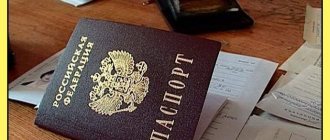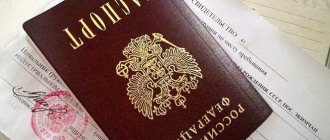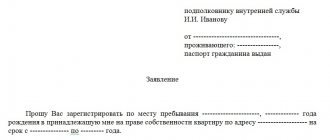Features of registration of spouses
So, spouses can live:
- on the territory of the spouse:
- on the territory of the spouse;
- in mutually purchased housing.
There are several options for accommodation for both spouses. However, the main question remains regarding the registration of one of the spouses in the apartment.
So, how to register your wife
? Registering a spouse in the husband’s apartment, in general, is not particularly difficult. You need to contact the Federal Migration Service department and submit the necessary papers. In addition, the husband's registration is required.
However, there is one peculiarity in the registration procedure. So, after the birth of a child to a couple, it will be registered according to the mother’s registration, and therefore, the woman’s place of residence becomes one of the key points that requires special attention.
Separately, it is worth noting that you should not worry that after registering the wife in the territory of the spouse, she will be able to dispose of the spouse’s property. It is a myth! Registration only gives the right to live in a home on legal terms, but does not give the right to enter into a number of transactions.
Registration procedure
The procedure for registering a husband or wife with his or her spouse follows the following algorithm:
- The first step before contacting the organization performing the registration directly is to obtain written consent from all citizens registered in the municipal apartment. The consent of the main tenant is mandatory.
- To register a spouse in a municipal apartment, you should contact one of the following institutions:
- Department of the Federal Migration Service;
- "My Documents" service;
- passport office of the Criminal Code.
It is important to remember that during registration the presence of the main tenant and the spouses themselves is required.
Registration of residents takes place at the Federal Migration Service, so if you contact this service directly, you can receive a registration document for a municipal square within 3 days. When sending documents to other institutions, the same procedure will take 2-3 days longer.
You can also submit all papers electronically through the State Services website.
- When contacting the Federal Migration Service, you must provide the following documentation:
- Passport of the registered spouse.
- Passport of the main tenant in whose name the rental agreement is drawn up.
- Written consent of all registered citizens in this apartment.
- Marriage certificate.
- Lease agreement or occupancy order.
- Military ID, if the citizen being registered is liable for military service.
- Departure sheet for the registered person. (This document must be issued at the previous place of residence. It is needed in order to have reliable information that the spouse registering does not have another place of residence.)
- At the FMS office, employees will provide an application form of a strictly established form, which must be filled out. Data on the newly registered citizen is entered into it.
- After submitting all documents, the passport office employee checks their availability.
- After the 3-day period, the registered citizen can contact the Federal Migration Service, where he will be issued a passport with a registration mark for permanent registration. If the registration is temporary, the tenant will receive a registration document. In this case, there is no stamp in the passport.
The registration procedure is free of charge. There is no state fee charged.
If controversial issues arise, they can be resolved by contacting the courts. If the court makes a positive decision, a copy of the court opinion should be attached to the documentation submitted to the Federal Migration Service.
Registration of citizens
The concept of registration is considered obsolete. Since the early 90s, the terms “permanent” and “temporary” registration have been common in housing law. Registration is carried out at the place of residence of the spouses. They are not subject to the housing standard per person. A husband can register his wife in a communal apartment or in a dorm room.
If he is the owner of a share in a communal apartment or owns the room on an individual basis, then registering his wife will not be difficult. The main thing is that he himself wants to register his wife. To register, you must fill out an application and attach documents. Payment of state duties and fees is not required.
Normative base
There is no separate law relating to such real estate. All situations related to registration at the place of residence are regulated by the following regulations:
- Civil Code of the Russian Federation;
- Government Decree No. 713 of July 17, 1995;
- Federal Law No. 5242 dated June 25, 1993.
To go through the registration procedure in a non-privatized apartment, you must submit documents through the MFC or the Main Department of Migration Affairs of the Ministry of Internal Affairs. The application form must be completed on site. Consent from registrants is also required.
Registration of the spouse in the spouse's privatized apartment
Let's take a closer look at the peculiarities of registering a wife with her husband in a privatized apartment. Registration must be carried out only at the actual place of residence, i.e. registration at the husband’s place of residence, as well as after the birth of a child or the purchase of a new home. The registration procedure takes place in accordance with the legislation of the Russian Federation, the Constitution of the Russian Federation, a set of rules, and decrees of the Government of the Russian Federation.
So, how to register in your husband’s apartment? To register, you need to collect a certain list of papers and submit them to the Russian Migration Service or contact the Federal Migration Service department.
Does a wife have the right to live in her husband’s apartment? After employees of the Federal Migration Service of the Russian Federation have successfully registered the wife in his house, she receives all the grounds for legal residence at the specified address. However, the wife does not have the right to sell housing or enter into any transactions regarding property. It will be possible to discharge a spouse only through the court. Thus, the registration of a wife with her husband gives only limited rights.
No matter what you are, everyone is relatives
To register and not ask officials for permission to do so - approximately this is how one can formulate the sensational decision of the Supreme Court, which is published today by Rossiyskaya Gazeta. The practically revolutionary verdict is devoted to a very painful problem that is on everyone’s lips. We are talking about registering spouses, children and parents in municipal housing.
How many generations of our citizens grew up under a system when husbands and wives, their children and parents, without the consent of officials, simply did not have the right to live together. The notorious “housing issue” and living where you were graciously allowed, has ruined more than one life and affected the destinies of many people.
Perhaps that is why registration turned out to be the pillar of many former unshakable values that was the first to collapse during the years of perestroika. Registration as an unconstitutional norm was abolished loudly to the applause of the entire country. Later it turned out that they applauded and rejoiced in vain. The revolution on paper eventually turned into a simple substitution of concepts. The word “registration”, as it turned out, was simply replaced with the word “registration”. Everything else remained in place. True, the sum still changed due to the change in the places of the terms. It increased along with inflation and bureaucratic needs.
The Law “On the Right of Citizens of the Russian Federation to Freedom of Movement, Choice of Place of Stay and Residence within the Russian Federation” was one of the first laws adopted in the wake of perestroika. And he really declared a lot of good things. But it was difficult to enter into life.
The law abolishing registration appeared in 1993. After the adoption of this law, all kinds of documents began to appear like mushrooms after rain, according to which arrival for residence in many regions or moving in with one’s family could be done as in the good old days - exclusively with the consent of local officials.
The report of the Commissioner for Human Rights in the Russian Federation for 2007 simply states this existing system. The report states that the permissive nature of “registration” continues to exist and that the right to freely choose a place of residence “is deliberately limited by the state itself on the basis of adopted regulations. As a rule, such actions of government bodies are justified by good intentions - the state’s concern for fulfilling its obligations to citizens, for example, in the field of medical and pension services and others. In some cases, state officials, without further ado, directly refer to the need to regulate migration flows.” The Commissioner for Human Rights is concerned that “the facts of restrictions on the constitutional right to choose a place of stay or residence are multiplying, and the range of pretexts used for this is increasing.”
“...state bodies, including the Prosecutor General’s Office, do not always respond properly to the Commissioner’s requests...”, and the responses received from government bodies to the Commissioner’s requests contain “duty replies.”
One of those people thanks to whom the decision of the Supreme Court published today appeared was lawyer Alexander Kichikhin. It was he who defended Alexander Velichkin, who filed this lawsuit. This is what Kichikhin told a Rossiyskaya Gazeta correspondent:
— In July of last year, Alexander Velichkin contacted us, who was denied the right by the Moscow government, represented by the Department of Housing Policy and Housing Fund, to move in and live with his wife in a municipal apartment. The same refusals were received by Muscovite Nelya Safarova, who intended to move in with her husband, as well as Muscovite Alexander Govyazin, who was denied the right by capital officials to live with his wife and two children.
According to our applicants, the cost of “consent” from officials to give permission to move in with their family members today ranges from 20 to 50 thousand rubles. Our clients did not have such amounts. The situation was paradoxical. In Moscow it was impossible to register with a husband or wife on the municipal square, but in the Moscow region it was possible. In the Moscow region, back in 2004, the authorities brought their legislation into compliance with federal legal norms. Similar regulations have been adopted in almost 40 constituent entities of the Russian Federation, and are also regulated by the Federal Migration Service.
Last fall, lawyers filed lawsuits in the Moscow City Court and the Supreme Court of Russia. The topic of the lawsuits is the cancellation of one resolution of the Moscow government and two resolutions of the government of the Russian Federation, which introduced norms that contradict Article 70 of the new Housing Code of the Russian Federation and Article 27 of the Constitution of the Russian Federation, the same one that abolished registration.
On December 18, 2007, the Moscow City Court refused to declare the resolution of the capital government illegal. But already in the new year 2008 - on January 16 - the Supreme Court of Russia decided that the spouse, their parents and children have the right to move into each other’s municipal housing without the consent of the landlord throughout the country.
Another important point of this decision is that the Supreme Court ruled that the area limitation does not apply to the occupancy of spouses, parents and children.
But this wonderful “barrel of honey” - the verdict of the country’s main court - turned out to have a fly in the ointment.
The lawyers appealed the decision of the Moscow City Court, which did not cancel the resolution of the capital government, to the cassation instance - the Supreme Court of Russia, however, other judges of the country's main court considered that the document of the Moscow government should continue to be in effect and Moscow “spouses, their parents and children” can move in in municipal housing is still only with the consent of the landlord!
The Ministry of Regional Development filed a cassation appeal and a petition to the Supreme Court to restore the deadline it missed to appeal this important decision.
After 8 months of litigation in the highest courts, Alexander Velichkin finally received a document with a visa from the municipal housing department to move in with his wife. Going out into the corridor, he saw a crying woman against the wall, who... was not allowed to move in with her husband.
document
Supreme Court decision
By the decision of the Supreme Court of the Russian Federation dated January 16, 2008, subparagraph “a” of paragraph 9 of the Rules for the Use of Residential Premises, approved by the Decree of the Government of the Russian Federation dated January 21, 2006, was declared invalid and not subject to application from the date this decision entered into legal force.
No. 25, to the extent that this norm requires the consent (in writing) of the landlord for the tenant to move into the residential premises occupied by him under a social tenancy agreement of his spouse, his children and parents.
Subparagraph “c” of paragraph 8 of the Model Agreement for Social Tenancy of Residential Premises, approved by Decree of the Government of the Russian Federation of May 21, 2005 N 315, was rejected as invalid, as it does not provide for the right of the landlord to prohibit the tenant from moving his spouse, his children and parents into the residential premises he occupies. in the event that after such move-in, the total area of the corresponding residential premises per 1 family member becomes less than the accounting norm.
The court decision came into force in accordance with the first paragraph of Part 1 of Art. 209 of the Civil Procedure Code of the Russian Federation upon expiration of the period for cassation appeal.
Registration of a spouse without the consent of other homeowners
This is prohibited by Russian law. The exception is persons under the age of majority. They are registered according to the application of the parents and the owner of the apartment. In this case, the consent of other residents in the apartment is not required for registration.
Many may wonder, is it so important for both spouses to register together? From a legal point of view, its absence does not have any negative consequences. Still, it all depends on the specific situation.
So, if the spouse is the owner of the property, then in the event of a divorce, the spouse is discharged from the apartment, according to a court order. After all, in this case, the wife ceased to be considered a relative. The situation will be different if the housing was acquired jointly, in which case the wife will be able to claim a share of the property jointly acquired during her lifetime.
Remember that until one of the spouses is discharged from the apartment, he retains full right to legally reside.
Permanent and temporary registration
Registration in a non-privatized apartment is allowed in two options - at the place of residence or address. In the first case, registration is not limited by time. In the future, it is possible to participate in privatization on an equal basis with other residents.
Is temporary registration allowed in a non-privatized apartment? It is possible, as in the case of property. The only difference from a permanent one is the limitation in action, which is set by the employer. You can extend it in the future. Temporary registration in a non-privatized apartment is allowed for a period of 3 months to 5 years.
Registration procedure through court
Every citizen of our country is guaranteed the right to go to court to protect their interests. To do this, you need to draw up and submit an application to the municipal authority for registration of a specific person (in this case, the spouse) in the residential premises.
When applying to a judicial authority, you have to perform a number of actions:
- Collect written consent from residents and the owner (if required).
- Draw up a statement of claim, even if there is only one refusal from the tenant.
- Collect a package of documents and evidence of the legality of actions.
- Participate in court hearings and defend your legal position.
- Wait for the court's decision.
How to file a claim correctly
The statement of claim must contain the following mandatory points:
- name of the judicial authority;
- information about the plaintiff and defendant (full name, residential address and contact details);
- a detailed statement of the grounds for applying for judicial protection (descriptive part);
- requirement to register, citing a violation of specific provisions of the law (petition part);
- appendix – list of documents for the application;
- date and signature of the applicant or his representative by proxy.
The appendix to the claim includes:
- social rental agreement;
- Marriage certificate;
- birth document of children (if any);
- consent or refusal of the residents (owner);
- check for payment of state duty;
- other documents substantiating that the owner committed illegal actions against the applicant.
The number of duplicates of the statement of claim is equal to the number of participants in the case. All documents are submitted in copies; the originals will be required during the trial for review and comparison with the case.
From the moment the claim is filed until the decision is made, as a rule, one month passes. If an appeal is filed against the decision, this period is increased by at least three weeks, or even a month. A positive court decision is transferred to the passport office, where the new resident is registered.
Dear readers! To solve your problem right now,
get a free consultation
— contact the duty lawyer in the online chat on the right or call:
You won't need to spend yours
time and nerves
— an experienced lawyer will take care of solving all your problems!
Rules for registration in municipal housing
In order to register a stranger in a municipal apartment, you will first need the consent of all persons living in this living space.
This provision is regulated by Article 70 of the RF Housing Code. Then you should notify in writing the municipal authorities that own the property.
The administration will make a positive decision only if there is no deterioration in living conditions. That is, if, according to the housing standards in force in the region for a given period, there will be enough square meters for each resident, including newly registered residents.
Otherwise, a refusal will be received.
To register a close relative (in addition to the spouse, this includes parents and children), the following aspect is important: is the spouse an employer, that is, the person for whom the social tenancy agreement is drawn up?
If so, the owner’s permission is not required, but the written consent of all residents, including those temporarily absent, is also required.
When someone is away and is not expected to return soon, you can ask for their consent in writing and then have the document certified by a notary. Without anyone's consent, it is only allowed to register a child under 14 years old in an apartment where at least one of the parents is registered.
If the employer is someone else (for example, the husband’s mother), then the wife will have to register on a general basis, with the written consent of the owner, tenant and other registered persons.
And if the municipality considers that with the moving in of a new tenant there will be a deterioration in living conditions (there will be fewer square meters per person), registration may be refused.
Also, if at least one of the adult residents registered in the apartment is against moving in and does not sign consent, the wife’s registration may not take place.
In this case, there is only one way out - going to court. But more on that below; first, let’s consider a successful case when the owner gave permission and the residents do not object. Where and with what documents should I apply?
Procedure
To register a wife, the husband needs to go with her to the passport office at the location of the property. There he expresses written consent to registration.
The law does not prohibit obtaining temporary registration for a wife. Then the wife fills out an application according to f. No. 1. The period of temporary registration is not limited and is determined by agreement between the spouses.
The husband may agree to the temporary registration of his wife if it is assumed that the marriage is fictitious and does not imply the goal of creating a family. Such a marriage may be declared invalid by the court.
Information about registration is entered into her passport - in the form of a stamp, indicating the locality and registration address.
Required documents
In 2021, for registration, including a wife to her husband, the following documents are required:
- application in form No. 6 (or in form No. 1 - for temporary registration);
- title documents for real estate - extract of ownership, lease agreement, etc.;
- departure sheet (if the spouse was previously deregistered);
- passports of husband and wife;
- house book (if available).
You may also need a marriage certificate, an extract from the house register, and birth certificates of children.
Submitting an application
The application is submitted at the passport office. The form contains information about the applicant, the owner of the residential premises, and information about the apartment.
The signatures of the applicant and the property owner must be certified by an official. This is not done if the title document for housing is notarized.
You can submit a document through the government services portal. You need to make sure that the service is provided electronically in a specific locality. It is possible to submit an application and documents through the MFC.
A sample application for registration at the place of residence is here.
A sample application for registration at the place of residence is here.
How to register in a municipal apartment with your husband
The algorithm for registering a spouse in an apartment depends on the method of submitting documents.
Where to contact
In order to register a person in a residential area, you can:
- personally contact the passport office of the management company;
- come to the police department or one of the Multifunctional Centers;
- use the Internet portal “State Services”.
To quickly complete registration, it is better to contact the Department of Internal Affairs.
Package of necessary documents
In the event that there are no objections from the neighbors in the apartment, in order to register a spouse in a municipal living space, the following documents must be presented:
- application for registration accompanied by the written consent of all residents (if the husband is not the tenant of the apartment under the contract);
- personal presence of all registration participants or notarized confirmation of the consent of the absent citizen;
- marriage certificate;
- departure sheet;
- extract from the house register;
- military ID;
- financial and personal account in a copy.
When all documents have been submitted, the passport office employee fills out special forms and sends them to the Federal Migration Service. If there are no complaints from the specialist, within a week from the moment of submission, the new tenant will be registered, and information about the official place of residence will appear in the passport. Or a certificate of temporary registration is issued if the application indicated a specific period for registration.
Most often, the reason for refusal of registration is a decrease in the living space standard or the lack of consent of the tenant.
It is recommended to immediately contact the judicial authority, since failure to register may result in administrative liability and the imposition of a fine on the wife (Article 19.15 of the Code of Administrative Offenses of the Russian Federation)
Civil marriage
Is it possible to register a common-law spouse? Undoubtedly! The status of a wife or husband, as well as the complete absence of status, does not affect registration in any way.
There are no advantages or disadvantages to joint registration or lack thereof. The only thing that joint registration provides is a certain factor of security from the fact that the husband and wife are assigned to the same place of residence. In addition, with joint registration, it becomes much easier for the baby to register, and both spouses have certain rights to use the property.
It is worth remembering that spouses register with each other on a general basis. There are some restrictions when registering, so you need to prepare the necessary documents carefully.
Going to court
The wife can go to court if she has the right to use the apartment, but the husband, as the person in whose name the housing is registered, does not consent to its registration.
The statement of claim is drawn up according to the rules of Art. 131-136 Code of Civil Procedure of the Russian Federation. References must be made to the relevant articles of the Civil Code of the Russian Federation, the Investigative Committee of the Russian Federation, the Housing Code of the Russian Federation and other regulations (depending on the specifics of the controversial situation).
As evidence, written documents must be submitted confirming the wife’s right to unhindered use of housing registered in her husband’s name.
This may be a marriage certificate, which indicates the date of marriage registration - important in order to prove that the apartment was purchased during marriage, and other written documents. In controversial situations, it is advisable to seek the help of a competent lawyer.
Is it possible to register a wife in a municipal apartment?
As a general rule, a citizen can register his spouse in a non-privatized apartment belonging to the municipal housing stock.
If he lives in it alone and no one’s consent is required, he must appear with his wife at the passport office and present a marriage certificate. All documents must have both signatures of the participants in the registration process.
It is more difficult to obtain registration for a spouse when a man lives with relatives who are registered with him in the same apartment.
Housing legislation requires the mandatory written consent of all neighbors, since the addition of another tenant is regarded as “deterioration of living conditions” (Article 53 of the Housing Code of the Russian Federation). But the obligation to obtain consent depends on who is the employer under the social tenancy agreement. If this is a spouse, then he does not need the consent of the other residents. If, for example, the husband is the son of the employer, the consent of that parent is necessary.
After receiving consent from all neighbors, the initiator must notify the municipality about the registration and move-in of a new tenant.
If no one living in the neighborhood has given their consent, the citizen can file a claim in court for forced entry into the apartment. Drawing up such a claim is not an easy task; you need to competently and convincingly present the essence of the issue so that the judge takes the side of the spouses and obliges the municipality or neighbors not to interfere with registration.
It is recommended to contact a lawyer who has successfully resolved housing disputes.









